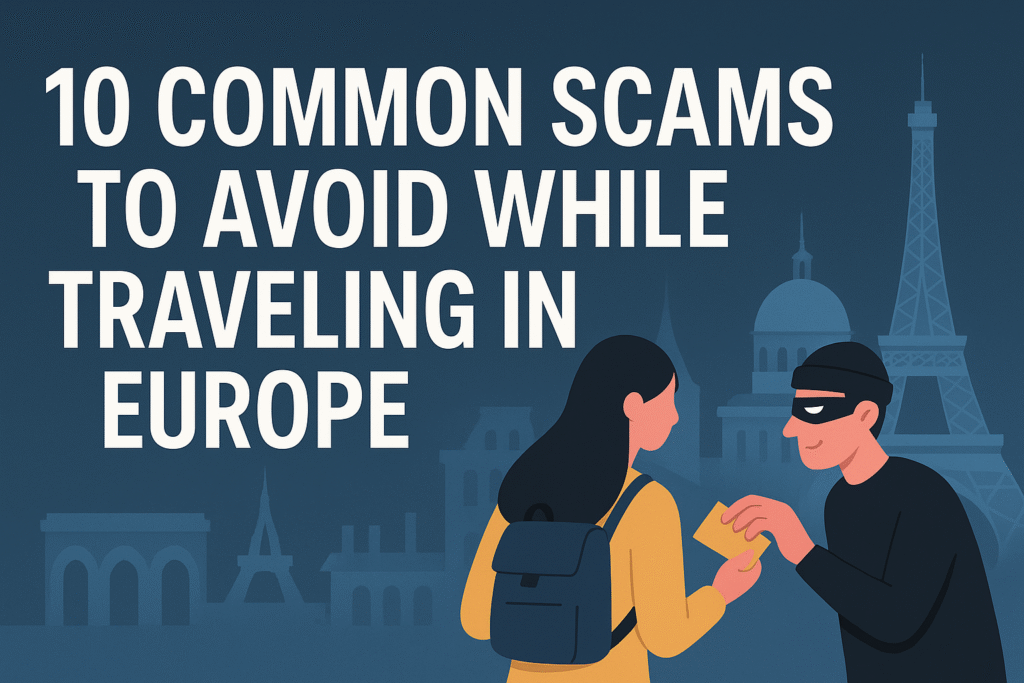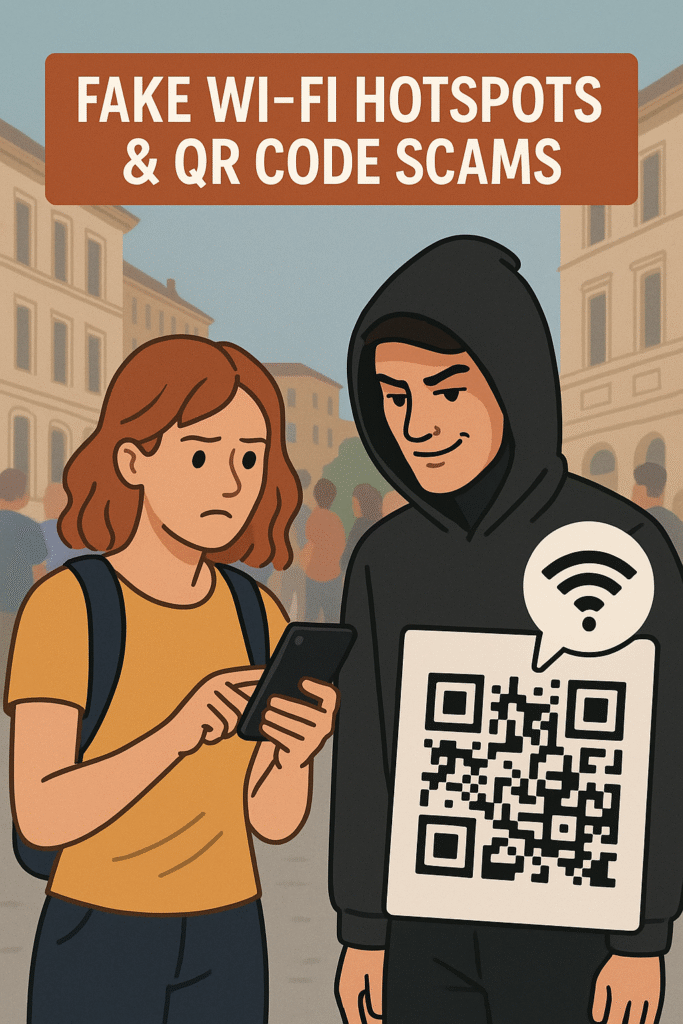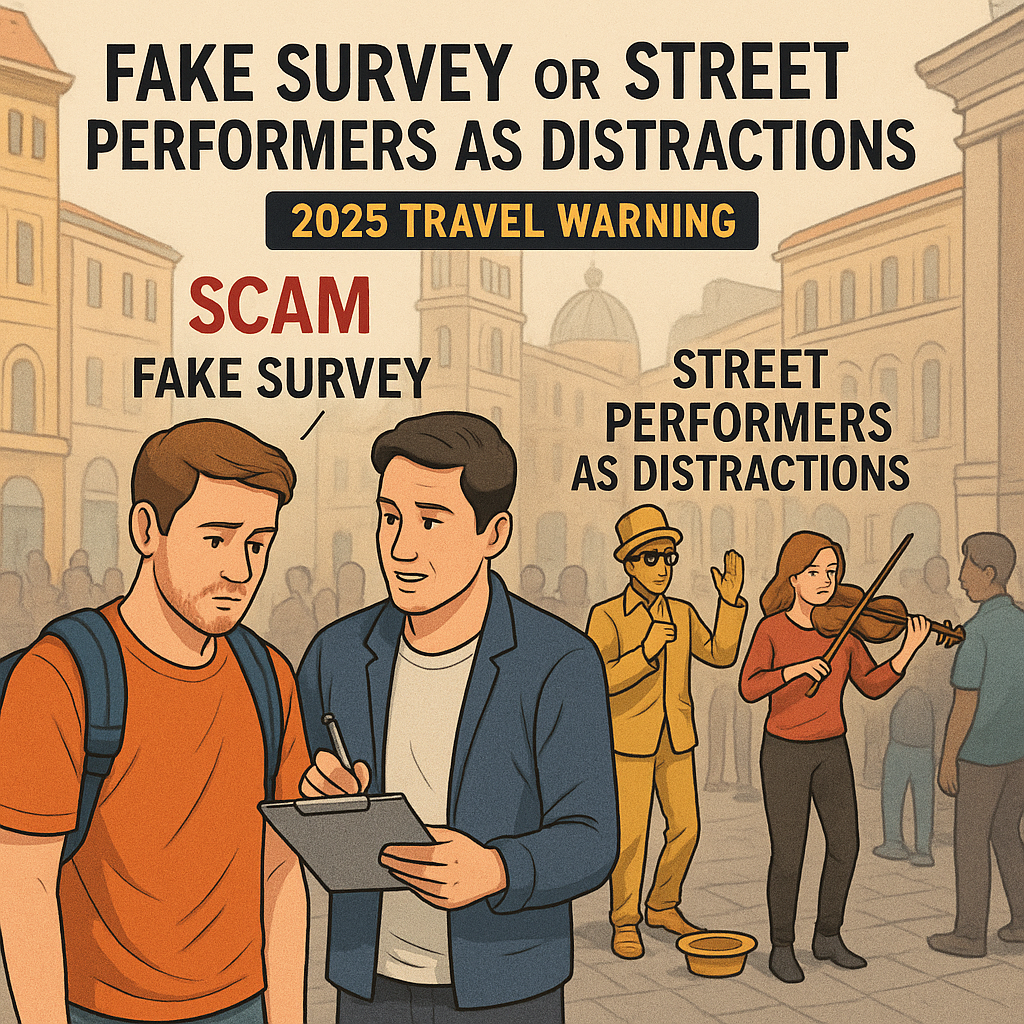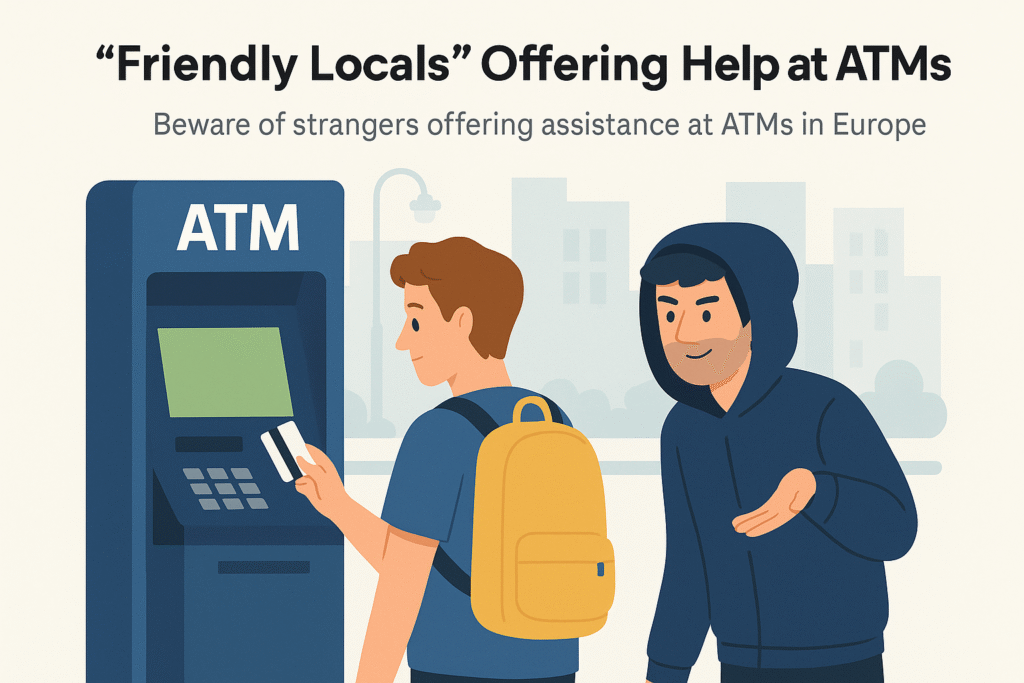Europe Travel scams 2025
Traveling through Europe in 2025 is unforgettable — but scammers are getting smarter too. From fake taxis to Wi-Fi traps, tourists are often targeted across iconic cities like Paris, Rome, and Prague. This guide reveals the top 10 travel scams in Europe, how to spot them, and how to protect yourself. Whether you’re a digital nomad, solo backpacker, or first-time explorer, these 2025 Europe travel safety tips will help you stay smart, alert, and scam-free on your journey. Bonus: Don’t miss the anti-theft tools and apps we recommend at the end!
In this guide, we’ll walk you through the top 10 most common travel scams happening across major European cities — from Paris and Rome to Prague and Barcelona. We’ll also show you exactly how to avoid them, stay safe, and enjoy your trip without becoming a target. As more people return to travel post-pandemic, scammers are out in full force. But with a little awareness and preparation, you’ll be smarter than their tricks.
Tip: At the end, we’ll also share some of the best anti-theft travel gear and apps that protect you in real-time. Whether you’re a solo traveler, a digital nomad, or a backpacker on a budget, this guide is your scam-proof travel companion.
Let’s get into it — and protect your trip, wallet, and peace of mind.
Disclosure: This post contains affiliate links. If you purchase through them, I may earn a commission at no extra cost to you — thank you for supporting Frugal Nomad Life!

Scam #1: The Fake Petition or “Deaf Mute” Scam
You’re strolling through a historic plaza — maybe near the Eiffel Tower or Prague’s Old Town Square — when a seemingly sweet teenager or young adult approaches with a clipboard. They smile, gesture silently, and point to a paper titled something like “Petition for the Deaf and Disabled” or “Support for Homeless Children.”
It seems harmless. You might sign out of sympathy.
But here’s what really happens:
-
They demand a donation (often aggressively) after you sign.
-
Your wallet or phone is targeted while you’re distracted.
-
Sometimes, they operate in groups — one distracts, another lifts valuables.
This scam is especially common in tourist-heavy areas of Paris, Rome, Barcelona, Vienna, and Berlin.
How to Spot It:
-
The paper is vague and poorly formatted.
-
No official organization is named.
-
The scammer may pretend not to understand your language.
How to Avoid It:
-
Never engage with clipboard petitioners near tourist attractions.
-
Keep valuables in a zipped, front-facing anti-theft bag or money belt.
-
Politely shake your head and keep walking.
🧳 Pro Travel Tip:
Use an RFID-blocking crossbody pouch to keep your cards and cash safe from pickpockets. We recommend this top-rated model on Amazon that travelers love for its slim fit and secure design.
Scam #2: “Friendly Locals” Offering Help at ATMs
You’re at an unfamiliar ATM in Budapest or Athens, trying to navigate the local language on-screen. Suddenly, a “friendly local” appears beside you, smiling and offering help with the machine — maybe even pretending to work for the bank.
They seem kind, but here’s the truth:
-
They’re watching you enter your PIN.
-
They may distract you and swap your card with a dummy card.
-
In some cases, they’ll grab your cash and run once it dispenses.
In busier tourist zones, another trick is offering unsolicited help and pressuring you to withdraw more cash, pretending there’s a fee or a system error.
Where this happens:
Common near train stations and airports in Eastern Europe, especially Hungary, Czech Republic, Bulgaria, and Romania — but also in busy areas of Spain and Italy.
How to Spot It:
-
Someone loiters near ATMs and watches people.
-
The “helper” insists you try again if the card is “not working.”
-
They may even point to a fake sticker on the machine claiming there’s “assistance available.”
How to Avoid It:
-
Never accept help from strangers at ATMs — no matter how friendly they seem.
-
Use machines inside a bank branch or secure building during business hours.
-
Shield your hand when entering your PIN, and never let your card out of sight.
Smart Travel Move:
Withdraw cash only during daylight in secure locations. And if your card gets stuck, call your bank immediately using the number on the back — not any number posted on or near the ATM, which could be part of the scam.
Scam #3: The Bracelet Trick — A Classic Tourist Trap
You’re strolling through Montmartre in Paris or admiring the view in Rome when a cheerful stranger approaches you — often smiling, saying something like “For good luck!” — and before you know it, they’re tying a bracelet around your wrist.
It seems innocent, even charming… until things escalate:
-
Suddenly, they’re demanding payment — often €10 to €30 — for the “gift.”
-
If you refuse, others may appear to intimidate you or block your way.
-
In some cases, they might reach into your pockets while you’re distracted.
It’s a well-coordinated distraction scam — targeting your politeness and catching you off guard in busy areas.
Where this happens:
Extremely common in Paris (Sacré-Cœur, Eiffel Tower area), Rome (Spanish Steps), and Barcelona (Las Ramblas). You’ll also see it in Athens, Prague, and even outside major cathedrals or viewpoints.
How to Spot It:
-
Someone tries to shake your hand or ties something on your wrist without asking.
-
They act overly friendly or pretend it’s a “gift.”
-
Afterward, they follow you or become aggressive about being paid.
How to Avoid It:
-
Politely but firmly say “No, thank you” and don’t let them touch your hands or wrists.
-
Keep walking and don’t engage in conversation — that’s part of the distraction.
-
Stay aware in tourist-heavy zones and avoid crowds gathering around street performers, where scammers often blend in.
Smart Travel Move:
Always keep small valuables in zippered, inner pockets — and consider using a money belt in crowded cities. These scammers often work in teams and look for easy targets.
Scam #4: Overpriced Taxi Rides & the “Broken Meter” Trick
You’ve just landed at the airport or arrived at a busy train station — you’re tired, maybe a little disoriented, and all you want is to reach your hotel. A taxi driver spots you and offers a ride, but once you’re in the car… things get shady:
-
They claim “the meter is broken” or simply refuse to turn it on.
-
Some take long, scenic detours to inflate the fare.
-
Others add extra charges for luggage, night rides, or “airport fees” that aren’t real.
Suddenly, what should have been a €15 ride becomes €60+, and you’re left arguing with a driver who might be blocking your way or holding your luggage hostage.
Booking flights with transparency is just as important — here’s our full guide on how to book flights without getting ripped off in Europe this year.
Where this happens:
Notorious in Rome, Athens, Prague, Bucharest, Istanbul, and even in some parts of Paris and Barcelona. Airports and tourist landmarks are high-risk zones.
How to Spot It:
-
The taxi has no official signage or meter — or the driver won’t use it.
-
They approach you directly, often aggressively, offering a ride before you even exit the station or airport.
-
They quote a vague or flat rate upfront without a meter.
How to Avoid It:
-
Never accept rides from drivers who approach you outside of taxi ranks — use licensed taxi stands or pre-book via an app.
-
Use official ride-hailing apps like Bolt, Free Now, Uber, or Bolt Taxi, which are available in many European cities and offer upfront pricing.
-
Always ask for the meter to be turned on — if they refuse, get out immediately.
-
Research average taxi fares from the airport to your hotel ahead of time — and screenshot them if possible.
Smart Travel Move:If a driver tries to scam you, don’t argue loudly — just photograph the license plate and threaten to report them to the local transport authority or tourist police. In many cities, tourists are protected by strong consumer laws — and scammers know this.
Scam #5: Fake Police Officers Demanding ID or Fines
You’re strolling through a popular European square or sitting at a café when two plainclothes individuals flash a badge and say they’re police. They claim they’re investigating counterfeit money, drugs, or stolen items — and ask to see your passport, wallet, or cash.
Once you hand it over, they may:
-
Confiscate cash “for inspection” and never give it back.
-
Swap your real money for counterfeit bills while pretending to check.
-
Simply grab your wallet and disappear while distracting you with questions.
Where this happens:
Common in Barcelona, Budapest, Prague, Rome, and Bucharest, especially in high-traffic tourist areas, train stations, or near ATMs.
How to Spot It:
-
The “officers” are in plainclothes, not full uniforms.
-
They never show proper ID, just flash a badge quickly.
-
They become aggressive or urgent, insisting you comply immediately.
-
They may target you after you’ve exchanged money or used an ATM.
How to Avoid It:
-
Real police in Europe almost never ask to inspect your cash or wallet.
-
Always ask for official identification and offer to go to the nearest police station.
-
Keep a copy of your passport, not the original, when walking around.
-
Store valuables and cash in a money belt or hidden pouch.
Smart Travel Move: Say calmly: “Let’s go to the police station to clarify this,” and start walking away. Most scammers will disappear immediately when they realize you’re not an easy target.
Scam #6: Fake Wi-Fi Hotspots & QR Code Scams
Free public Wi-Fi can feel like a lifesaver when you’re abroad — especially in airports, train stations, or cafés. But not all networks are safe. Cybercriminals often set up fake Wi-Fi hotspots with names like “Free_Airport_WiFi” or “Cafe_WiFi_Guest” that seem legitimate but its kind of europe travel scams 2025 may see. Once you connect, they can monitor everything you do — including logging into your email, bank, or even PayPal.
networks are safe. Cybercriminals often set up fake Wi-Fi hotspots with names like “Free_Airport_WiFi” or “Cafe_WiFi_Guest” that seem legitimate but its kind of europe travel scams 2025 may see. Once you connect, they can monitor everything you do — including logging into your email, bank, or even PayPal.
Meanwhile, in major European cities, QR codes have become common for restaurant menus, museum guides, or booking tours. Scammers place fake QR code stickers over legitimate ones. When scanned, they may:
-
Redirect you to phishing websites that steal your data
-
Install malware on your phone
-
Trick you into entering credit card information for a fake “reservation fee”
Where this happens:
Cities with a lot of digital tourism — Paris, Rome, Amsterdam, Berlin, and Barcelona — especially around transport hubs, major attractions, and outdoor dining areas.
How to Spot It:
-
A Wi-Fi network with no password or security is a red flag.
-
QR codes that are scratched, peeling, or printed on stickers.
-
Websites that load after scanning look unprofessional, ask for personal info, or demand payment for something free.
How to Avoid It:
-
Use a VPN (Virtual Private Network) before connecting to public Wi-Fi. It encrypts your data and protects your privacy.
-
Ask staff for the correct Wi-Fi name before connecting — don’t guess.
-
Inspect QR codes — if it’s a sticker on top of something, skip it.
-
When in doubt, type URLs manually or use official apps instead of scanning unknown codes.
Smart Travel Move: Install a VPN app like NordVPN or Surfshark before your trip and avoid checking sensitive accounts (like banking or email) on public Wi-Fi. Always double-check URLs after scanning — if they look off, close the page immediately.
Scam #7: Fake Petition for Charity or School Donations
You’re strolling near a famous landmark when a polite young person with a clipboard approaches:
“Do you have a moment to sign a petition for the deaf children?”
They smile, gesture kindly, and show you a paper filled with names. Once you sign, they ask for a “donation”, often insisting on €10, €20, or more, and pressuring you if you hesitate.
Sometimes they claim to represent a school, a disability charity, or even animal shelters — all fake. In many cases, the petition is a decoy to distract you while another scammer pickpockets you.
Where this happens:
Extremely common in Paris (Eiffel Tower, Montmartre), Rome (Spanish Steps, Colosseum), Barcelona (La Rambla), and even around major transit hubs and plazas across Eastern Europe.
How to Spot It:
-
They often work in groups and target tourists.
-
They don’t wear uniforms, have no official ID, and are vague about the organization they represent.
-
They’ll approach quickly and often block your path.
How to Avoid It:
-
Politely say “No, thank you” and keep walking.
-
Don’t let them touch your phone, map, or hands.
-
Never give money to anyone who approaches unsolicited in public spaces.
Smart Travel Move: If you genuinely want to support local causes, research official NGOs or registered charities in the area — and donate directly through their websites or partner organizations. Avoid cash donations to strangers in tourist zones.
Scam #8: Fake Accommodation Agents or “Helpful Locals” at Train Stations
You’ve just arrived in a new city, tired from a long train ride, and before you can pull out Google Maps, someone approaches you at the station:
“Are you looking for a place to stay? I know a great hotel — very cheap, clean, central!”
They may seem friendly, helpful, and even wear a lanyard to appear official. But what you’re really dealing with is a fake accommodation agent. These scammers lure you into overpriced, unsafe, or nonexistent guesthouses and take a commission — or worse, your deposit — for rooms that are nothing like what they promised.
In other versions of the scam, a local may claim your hotel is overbooked, closed, or in a “bad area” and try to reroute you to their “recommended” property.
Where this happens:
Common in train stations across Budapest, Prague, Sofia, Rome, and even some Balkan cities. Scammers hang out in arrivals areas and approach solo travelers or confused tourists.
How to Spot It:
-
They approach unsolicited, usually just as you arrive.
-
They push hard to lead you to a specific hotel or flat.
-
They may offer to carry your bags, giving you little chance to say no.
How to Avoid It:
-
Always book accommodation in advance through trusted platforms like Booking.com or Hostelworld.
-
Don’t share your hotel name with strangers. Politely decline offers and walk away.
-
If you haven’t booked yet, go inside the station’s official tourist info desk instead.
Smart Travel Move: Use apps like Maps.me, Rome2Rio, or Google Maps offline to navigate directly to your stay. Avoid people who insist on guiding you — and never pay cash deposits on the street. If you’re in doubt, step into a café or shop and use Wi-Fi to confirm your details privately.
Scam #9: Fake Surveys or Street Performers as Distractions

You’re enjoying a relaxed afternoon stroll in a bustling square — suddenly, someone approaches with a clipboard and a smile:
“Hi! We’re doing a quick survey for a children’s charity. Can you answer just one question?”
While you’re trying to be polite, their accomplice may be slipping a hand into your bag or grabbing your phone from a café table while your attention is diverted.
In another variation, you’re watching a talented street performer or dance circle, and just as the crowd thickens and applause erupts — someone is skillfully removing wallets or cameras from distracted tourists.
Where this happens:
This distraction scam is common in Barcelona’s Las Ramblas, Rome’s Piazza Navona, Parisian landmarks, Berlin’s Alexanderplatz, and nearly every train station, crowded market, or tourist festival.
How to Spot It:
-
A stranger enthusiastically asks for a “quick question,” charity support, or petition signature.
-
The clipboard is used to hide their hands or create a visual barrier.
-
Street performers gather tight crowds — and pickpockets blend in nearby.
How to Avoid It:
-
Never hand over your phone or bag while talking to strangers, even “charity” workers.
-
Don’t sign anything in public unless it’s through a legit organization booth with ID.
-
Keep valuables in zipped bags worn in front of you, especially in tight spaces.
-
If you’re watching a performance, stay a bit back and keep a hand on your belongings.
Smart Travel Move: Use a crossbody anti-theft bag or money belt when in crowded areas. And don’t feel rude walking away — real charities won’t pressure you in the street. Your awareness is your best defense.
Scam #10: Fake Ticket Inspectors on Public Transit
You’re riding the metro in Paris, Rome, or Prague, and a pair of stern-looking individuals flash badges and demand to see your ticket. You hand it over, and suddenly they claim it’s invalid — or worse, that it’s a serious offense — and insist you pay a hefty “on-the-spot fine” in cash.
What’s the problem? They’re not real inspectors at all. Just scam artists dressed smartly with fake credentials, preying on tourists unfamiliar with the transit system and too nervous to question authority.
Where this happens:
This scam is especially common in cities with strict ticket rules but infrequent inspections, like:
-
Prague’s Metro
-
Rome’s Termini Station
-
Budapest trams and metros
-
Paris RER lines
How to Spot It:
-
Inspectors not wearing full uniforms or lacking official ID.
-
They pressure you for cash payment only, and may not offer a receipt.
-
They act quickly and discourage you from contacting real authorities.
How to Avoid It:
-
Always validate your ticket if required (some systems need stamping before boarding).
-
Ask to see their official ID and take your time reading it.
-
Politely say: “Let’s go to the station desk together to clarify.”
-
Never pay fines in cash unless you’re certain they are real inspectors — most cities allow card or online payments with receipts.
Smart Travel Move: Use official apps or machines to buy and validate tickets. If you’re unsure of the rules, look for signage at metro entrances or ask station staff before boarding.
If you’re looking for cheap and safe European destinations that are still off the radar (and generally scam-free), we’ve got you covered.
Final Tips: Outsmarting Scammers Without Stress
Europe in 2025 is still one of the most magical and accessible places to explore — but even the most stunning destinations can come with a few pitfalls. By staying alert and informed, you can easily avoid these scams without letting paranoia spoil your trip.
Here’s how to stay safe without losing the joy of spontaneous adventure:
-
Trust your instincts — if something feels off, it probably is. Walk away politely but firmly.
-
Keep essentials secure — use a money belt, crossbody bag, or anti-theft backpack, especially in crowded areas.
-
Research local scams before you arrive — forums like Reddit’s r/travel and Facebook groups are full of real traveler stories.
-
Be confident and aware — scammers often target tourists who look confused, distracted, or hesitant.
-
Take photos of real inspectors’ badges or city signage to compare if approached.
Bonus Tip: Many scams happen at entry points — airports, train stations, bus terminals. Stay especially alert when you first arrive in a city and haven’t found your bearings yet.
At the end of the day, the best protection is a mix of awareness and preparation. These travel scams don’t define Europe — but knowing how to avoid them can keep your trip worry-free and filled with the right kind of memories.Want to go beyond scams and travel smarter overall? Check out our full list of budget travel tips for 2025 to save money and avoid common mistakes while planning your trip.
💡 Travel Smarter & Stay Safer in 2025
Planning your next European adventure? Equip yourself with smart tools trusted by budget-savvy travelers:
- 💳 Revolut Card – Pay worldwide with low fees, hold multiple currencies, and track your travel spending.
- 🛡️ SafetyWing Travel Insurance – Affordable global coverage for digital nomads and long-term travelers.
- 💰 WayAway – Book flights and hotels with cashback rewards for every booking.
🧳 Essential Anti-Theft Travel Gear
- 🎒 Hidden RFID Money Belt – Concealed under clothes, protects your cash, passport, and cards from theft and scanning (Amazon Affiliate).
- 🎒 RFID-Blocking Crossbody Sling Bag – Hands-free, anti-theft design with shielded compartments. Great for day tours and public transit.
These are among the most trusted RFID money belts for travelers — sleek, safe, and stress-free under your shirt or jacket.
📬 Bonus: Want weekly travel hacks and safety tips? Subscribe to our free travel newsletter and explore smarter!
Disclosure: This post contains affiliate links. If you purchase through them, I may earn a commission at no extra cost to you — thank you for supporting Frugal Nomad Life!

